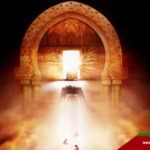By Dr. Muqtedar Khan
We live in a world of displaced populations. Nearly one out of seven persons alive today is a migrant. Over a quarter billion people are international migrants and over three quarters of a billion are migrants within the borders of their own countries. As of mid 2019 there were over 70 million refugees worldwide, people who have been forced by war, persecution and environmental crisis to leave their homes. A vast majority of these refugees are from Muslim nations; Syria, Afghanistan, Iraq, Myanmar, Bangladesh, and Yemen. And contrary to perceptions that these Muslim migrants are flooding the West, the biggest recipients of refugees are also Muslim nations like Lebanon, Jordan, Turkey, Afghanistan and Pakistan. While global migration is primarily for economic reasons, and may also be an indicator of the global economies success, refugee data represent only tragedies and it is clear that the Muslim World bears more than its fair share of them.
This global reality and the teachings of Islam both mandate that Muslims should be especially active in addressing the global refugee crisis. Facing the challenges is not about Sadaqa or aid alone. It includes mobilization and activism for war termination, peace building, restoration, taking care of the victims, protection and return of refugees and rehabilitation of devastated cities and villages across nations. We need to end existing conflicts, prevent those which are imminent and then rebuild nations so people can go back to their homes. Yes the challenges are humongous and Muslims, a community of 55 nations and nearly two billion people, must at least do its fair share.
It is common knowledge among Muslims, that Islam is a religion of refugees and migrants. The Islamic calendar starts not with the first revelation of the Qur’an in 610 AD but with the migration of Prophet Muhammad (pbuh) and his companions from Mecca to Medina in 622 AD. Prophet Muhammad (pbuh) and his companions are erroneously labelled as migrants in Islamic literature when indeed they were refugees who were escaping a decade of religious persecution in Mecca. Given the historical origins of the first Muslim community, it is surprising that Muslims have not made the care, protection and advocacy of refugees a pillar of their faith.
Maybe it is time for American Muslims to determine that not only will Muslims not engage in religious persecution like the Prophet had to suffer, nor will they stand by while there is religious persecution anywhere on earth. We, American Muslims, should be the first to come to aid of refugees, forced to leave their homes like Muhammad (pbuh) and his companions.
The story of Prophet Muhammad’s migration has another side to it which is often neglected. The story of the Ansar, the helpers, the people of Medina who received and accepted the refugees from Mecca. While the story of the migrants (Mahajirs) is a tale of faith, persecution, and suffering, the story of the Medinans (the Ansar) is one of sacrifice, giving, tolerance and openness. While the Meccans had no choice but to migrate, the Medinans chose to provide refuge. In my latest book, Islam and Good Governance: A Political Philosophy of Ihsan, I argue that a society based on Ihsan (doing beautiful things) would be motivated not be self-regarding politics but by other-regarding interests. The Muhsins (those who do Ihsan) will act not in self-interest, but in the interests of others like the Ansar of Medina. Nothing can be more virtuous than what the Ansar did. The Qur’an records their concern for others:
They love those who emigrated to them and find not any want in their breasts for what the emigrants were given but give [them] preference over themselves, even though they are in privation. — Qur’an 59:9
The Qur’an places a lot of importance on the plight of migrants and refugees, making them eligible for Zakat (distributive justice). It also commands Muslims to provide protection to refugees even if they are nonbelievers.
And if any disbeliever seeks your protection, then grant him protection so that he may hear the words of Allah . Then deliver him to his place of safety. — Qur’an 9:6.
Prophet Muhammad (pbuh) who was himself a migrant/refugee understood their plight first hand and so he too commanded Muslims to help those in need.
“Whoever grants respite to someone in difficulty or relieves him, Allah will shade him on the Day of Resurrection when there is no shade but his.” — Al-Tirmidhī 1306
Some of us American Muslims, who are themselves immigrants and refugees (66%), have a unique opportunity to be both Mahajir and Ansar. We came here as immigrants seeking a better life, and now that we have found our American dream, it is our time to be Ansar (helpers); to advocate, to fight for and to support those who are forced to leave their homes. Fighting for those who are in need is the best sunnah, a true way of bringing Ihsan into our lives.
Do some good (Ihsan)
Allah loves those who do good things (Muhsineen) — Qur’an 2:295
Dr. Muqtedar Khan is a professor at the University of Delaware and a Senior Fellow at the Center for Global Policy. He is the Academic Director of the State Department’s American Foreign Policy Institute. He is the author of a new book Islam and Good Governance: A Political Philosophy of Ihsan and tweets at @MuqtedarKhan. His website is www.ijtihad.org.








